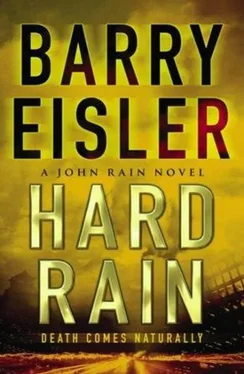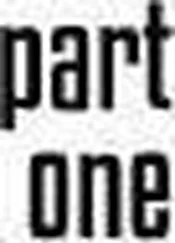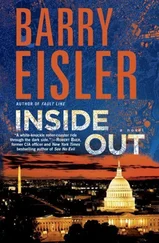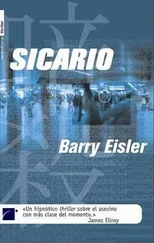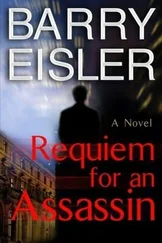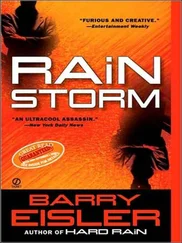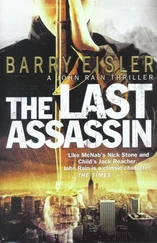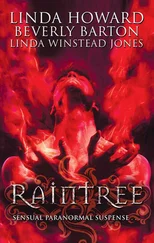“Why don’t we go to the bar,” I said. “I’ll tell you what you want to know.”
She nodded without looking at me.
What I had in mind was not the lobby-level Rendezvous Bar, which is so heavily trafficked as to be useless from a security standpoint, but the mezzanine-level Old Imperial Bar. The latter is a relic from the original Frank Lloyd Wright-designed Imperial that was torn down in 1968, ostensibly in the name of earthquake safety, more likely in obeisance to misguided notions of “progress.” A walk to the mezzanine level would mean moving back across the lobby, taking a flight of stairs, and making several turns around mostly deserted corridors with various points of egress. If Midori had anyone following her, either with her knowledge or without, they’d have a hard time remaining unexposed while we moved.
We took the stairs to the mezzanine level. With the exception of the dozen or so patrons seated in the restaurants we passed, there was no one about. I checked behind us while we waited at the bar entrance to be seated. No one approached. It seemed she was alone.
We sat next to each other in one of the high, semicircular booths, hidden from the entrance. Anyone hoping to confirm our presence now would have to come inside and reveal himself. I ordered us a couple of eighteen-year-old Bunnahabhains from the bar’s excellent single malt menu.
The feeling was a bit odd under the circumstances, but I was glad to be back at the Old Imperial. Windowless and low-ceilinged, dark and subdued, intimate despite its spaciousness, the bar has an air of history, of gravitas, perhaps a consequence of being the sole surviving feature of the hotel’s martyred progenitor. Like the hotel itself, the Old Imperial feels a bit past its prime, but retains a dignified beauty and mysterious allure, like a grande dame who has seen much of life, known many lovers, and kept many secrets, who does not dwell on the glory of her more exuberant youth but who has neither forgotten it.
We sat in silence until the drinks arrived. Then she said, “Why?”
I picked up my Bunnahabhain. “You know why. I was hired.”
“By whom?”
“By the people your father took that disk from. The same people who thought you had it, who were trying to kill you.”
“Yamaoto?”
“Yes.”
She looked at me. “You’re an assassin, aren’t you? When there are rumors that the government has someone on the payroll, they’re talking about you, right?”
I let out a long exhalation. “Something like that.”
There was a pause. Then she asked, “How many people have you killed?”
My eyes moved to my glass. “I don’t know.”
“I’m not talking about Vietnam. Since then.”
“I don’t know,” I said again.
“Don’t you think that’s too many?” The mildness of her voice made the question worse.
“I don’t… I have rules. No women. No children. No acts against nonprincipals.” The words echoed flatly in my ears like a moron’s mantra, talismanic sounds suddenly stripped of their animating magic.
She laughed without mirth. “ ‘I have rules.’ You sound like a whore who wants credit for virtue because she won’t kiss the clients she fucks.”
It stung. But I took it.
“And then your friend from the Metropolitan Police Force told me you were dead. And you let me believe it. Do you know I grieved for you? Do you know what that’s like?”
I grieved for you, too , I wanted to say.
“Why?” she asked. “Why would you put me through that? Even beyond what you did to my father, why would you put me through that?”
I looked away.
“Tell me, goddamn it,” I heard her say.
I gripped my glass. “I wanted to spare you. From this… knowledge.”
“I don’t believe you. I half knew anyway. What did you think I would think when the evidence of corruption on that disk, which my father died trying to get published, wasn’t? When I tried to find out what had been done with your remains so I could offer my respects, but couldn’t?”
“I didn’t know it wouldn’t be published,” I said, not looking at her. “In fact I thought it would be. But regardless, I expected you to forget about me. At times I had my doubts, but what could I do at that point? Just show up in your life and explain? What if I’d been wrong, what if you had forgotten, you didn’t suspect, you’d gotten on with your life the way I’d hoped?” I looked at her. “I would have just caused you more pain.”
She shook her head. “You couldn’t have caused me more pain if you’d tried.”
There was a long silence. I said, “Are you going to tell me how you found me?”
She shrugged. “Your friend from the Metropolitan Police Force.”
I was taken aback. “Tatsu contacted you?”
“I contacted him. Several times, in fact. He kept blowing me off. Last week I came back to Tokyo and went to his office. I told a receptionist that if Ishikura-san didn’t see me I would contact the press, I would do everything I could do to make a public scandal. And I would have, you know. I wasn’t going to give up.”
She’d been brave, almost a little reckless. Tatsu wouldn’t have harmed her, even in response to a threat, but she had no way of knowing that. Another indication of just how desperately angry she had been.
“He saw you?” I asked.
“Not right away. He called me this afternoon.”
This afternoon. Right after I’d refused him, then.
“And he told you that you could find me here?”
She nodded.
How had he managed to track me down again? Probably those damn cameras. You can see some of them. Not all , I remembered him saying. Sure, use the camera to get a general fix on my location, then send men to the likely hotels in the area, if necessary, with the same photo they had fed to the cameras and the facial recognition software, to narrow things down.
I’d been a fool to stay in Tokyo, although with the kind of warning I had to give Harry, an overseas phone call would have been less than optimal.
What was that wily bastard up to, though? “Any thoughts on why Tatsu would agree to see you after a year of stonewalling?” I asked.
She shrugged. “Probably my threat.”
I doubted it. Tatsu didn’t know her as well as I did. He would have mistakenly assumed she was bluffing.
“You really think that was all there was to it?” I asked.
“Maybe. Maybe he had some ulterior reason for wanting us to meet. But what was I going to do, spite him by refusing to see you?”
“I suppose not.” And Tatsu would have supposed it, too. I felt a momentary wave of annoyance, bordering on hostility, toward Tatsu and his ongoing machinations.
She sighed. “He said that telling me you were dead was his doing, not yours.”
This was supposed to get back to me. Did he think I was going to take out Murakami in gratitude, as a quid pro quo?
“What else did he tell you?” I asked.
“That you helped him get the disk expecting him to turn it over to the media for publication.”
“Did he tell you why he didn’t?”
She nodded. “Because its information was so explosive that it might have brought down the Liberal Democrats and paved the way for Yamaoto’s ascension.”
“Sounds like you’re pretty up-to-date, then.”
“I’m a long way from up-to-date.”
“What about Harry?” I asked after a moment. “Why didn’t you go to him?”
She looked away and said, “I did. I wrote him a letter. He said he’d heard you were dead, and didn’t know any more than that.”
The way she had looked away… there was something she wasn’t telling me.
“You believed him?”
“Should I not have?”
Good recovery. But there was something more there, I thought.
Читать дальше
